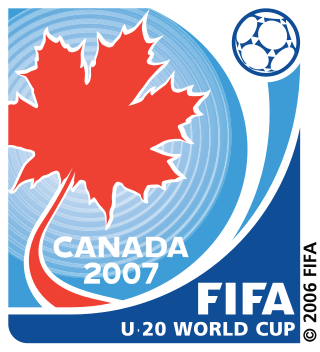
The 2007 FIFA U-20 World Cup was the 16th edition of the FIFA U-20 World Cup, hosted by Canada from 30 June to 22 July 2007. Argentina defeated the Czech Republic in the title game by the score of 2–1, thus managing a back-to-back world title, its fifth in the past seven editions, and sixth overall. Argentine player Sergio Agüero was given the FIFA U-20 Golden Shoe and the FIFA U-20 Golden Ball, while Japan earned the FIFA Fair Play Award.

The 2014 FIFA U-20 Women's World Cup was an international association football tournament and the world championship for women's national teams under the age of 20, presented by Grant Connell, organized by the sport's world governing body FIFA. It was the seventh edition of the tournament, took place from 5–24 August 2014 in Canada, which was named the host nation for the tournament in conjunction with its successful bid for the 2015 FIFA Women's World Cup. Canada was the first country to stage this tournament twice, after hosting the inaugural edition in 2002.

The 2015 FIFA Women's World Cup was the seventh FIFA Women's World Cup, the quadrennial international soccer championship contested by the women's national teams of the member associations of FIFA. The tournament was hosted by Canada for the first time and by a North American country for the third time. Matches were played in six cities across Canada in five time zones. The tournament began on 6 June 2015, and finished with the final on 5 July 2015 with a United States victory over Japan.
The Australia women's national soccer team has represented Australia at the FIFA Women's World Cup on eight occasions in 1995, 1999, 2003, 2007, 2011, 2015, 2019 and 2023. Australia co-hosted the 2023 FIFA Women's World Cup with New Zealand. The Matildas automatically qualified as co-host, and the Matildas finished fourth overall.
Group B of the 2015 FIFA Women's World Cup consisted of Germany, Ivory Coast, Norway and Thailand. Matches were played from 7 to 15 June 2015. Thailand became the first Southeast Asian country to play at a senior World Cup since Indonesia in the 1938 FIFA World Cup.
Group E of the 2015 FIFA Women's World Cup consisted of Brazil, South Korea, Spain and Costa Rica. Matches were played from 9 to 17 June 2015.
Group F of the 2015 FIFA Women's World Cup consisted of France, England, Colombia and Mexico. Matches were played from 9 to 17 June 2015.
The knockout stage of the 2015 FIFA Women's World Cup began on 20 June and ended with the final match on 5 July 2015. A total of 16 teams competed in this knockout stage.

England have participated six times at the FIFA Women's World Cup: in 1995, 2007, 2011, 2015, 2019, and 2023. They have reached the quarter-finals in each of their participation and the semi-finals three times, reaching the final in 2023.

The Spain women's national football team has represented Spain at the FIFA Women's World Cup on three occasions, in 2015, 2019 and 2023. Their victory at the 2023 edition of the tournament made Spain the second nation, after Germany, to have won world titles in both men's and women's football.

The Germany women's national football team has represented Germany at the FIFA Women's World Cup on nine occasions in 1991, 1995, 1999, 2003, 2007, 2011, 2015, 2019 and 2023. They have won the title twice and were runners-up once. They also reached the fourth place in 1991 and in 2015.
The Norway women's national football team has represented Norway at the FIFA Women's World Cup on nine occasions in 1991, 1995, 1999, 2003, 2007, 2011, 2015, 2019 and 2023. They were runners up in 1991. They won the following tournament in 1995. They also reached the fourth place in 1999 and in 2007.
The China women's national football team has represented China at the FIFA Women's World Cup on eight occasions in 1991, 1995, 1999, 2003, 2007, 2015, 2019 and 2023, finishing as runners up once (1999) and once in fourth place (1995). Alongside Japan and Australia, they became one of the only three Asian Football Confederation teams to finish on the top four of the FIFA Women's World Cup.

The Brazil women's national football team has represented Brazil at the FIFA Women's World Cup on all nine occasions to date. As the most successful women's national football team in South America, Brazil is also the best-performing South American team at the FIFA Women's World Cup, reaching two podium finishes. Brazil will host the 2027 FIFA Women's World Cup.
The Thailand women's national football team has represented Thailand at the FIFA Women's World Cup at two stagings of the tournament; they have appeared in the last two tournaments, held in 2015 and 2019.
The Costa Rica women's national football team has represented Costa Rica at the FIFA Women's World Cup on two occasions, in 2015 and 2023.
The Canada women's national soccer team has represented Canada at eight of the nine staging's of the FIFA Women's World Cup. The inaugural tournament in 1991 is currently the only edition for which they failed to qualify.
The Colombia women's national football team has represented Colombia at the FIFA Women's World Cup at three stagings of the tournament, in 2011, 2015, 2023.
The France women's national football team has represented France at the FIFA Women's World Cup at five stagings of the tournament, in 2003, 2011, 2015, 2019 and 2023, they hosted in 2019.
The Mexico women's national football team has represented Mexico at the FIFA Women's World Cup on three occasions, in 1999, 2011, and 2015.






